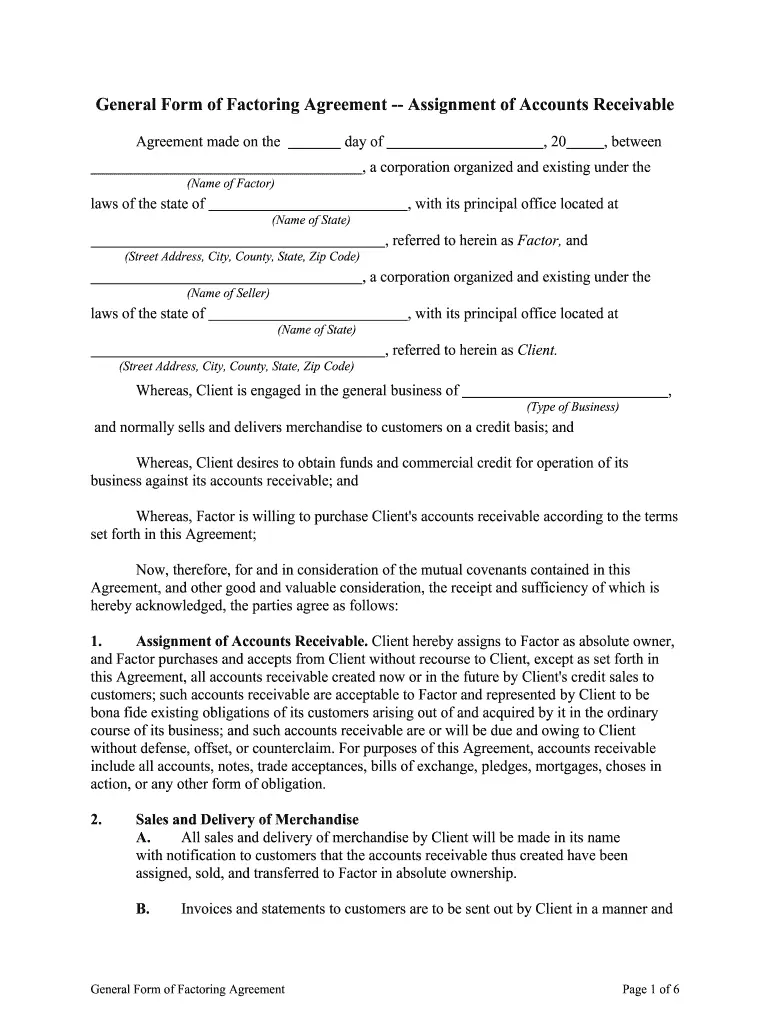
 Finance & Accounting
Finance & Accounting7 Essential Things to Consider in Factoring Agreements

Content
A factoring agreement is a crucial contract between a factoring company and a business, enabling the sale of accounts receivable for immediate cash. They outline terms like fees, payment schedules, and responsibilities. However, accuracy is paramount to uphold mutual trust and compliance.
An accurate agreement mitigates risks, streamlines operations, and fosters a transparent partnership. It secures legal recourse in case of discrepancies, upholding integrity and bolstering confidence in the factoring process, ultimately nurturing a robust and enduring business relationship.
In this blog, we delve into the essential items to be looked for in a factoring agreement in detail.


7 Common Things to Consider in Factoring Agreements
When entering into a factoring agreement, it's crucial to consider various factors to ensure that the terms are favorable and aligned with the needs. The seven common things to consider in factoring contract are explained below:
1. Invoice Amount
Examining the invoice amount is crucial in factoring agreement as it directly impacts cash flow. Accurate invoicing ensures transparency and helps determine the financing value. Assessing invoice amounts also aids in mitigating risks, preventing discrepancies, and maintaining a healthy financial relationship between the parties involved.
To ensure accuracy, consider the following:
- Verify Line Items: Scrutinize each line item on the invoice for accuracy and alignment with agreed-upon terms.
- Cross-Check Quantities: Ensure that the quantities mentioned match the delivered goods or services.
- Confirm Pricing: Double-check the pricing to avoid discrepancies that may impact payment calculations.
- Check Currency and Units: Verify that the currency and units of measurement align with the agreed-upon terms.
2. Factoring Fee
The factoring fee is a crucial component of a factoring contract as it ensures sustainable operations. This fee encompasses the cost of services provided, mitigating risks, maintaining liquidity, and sustaining the financial health to continue offering tailored solutions to clients. It reflects the value derived from facilitating immediate cash flow against receivables, enabling businesses to focus on growth while outsourcing credit and collection functions.
To evaluate the factoring fee:
- Percentage Calculation: Clearly comprehend the percentage of the invoice amount retained by the factor as a fee.
- Additional Charges: Identify any hidden or supplementary charges beyond the basic factoring fee.
- Comparison with Market Rates: Evaluate the factoring fee in comparison to prevailing market rates for similar services.
- Fee Structure Terms: Understand the specific terms and conditions governing the calculation and application of the factoring fee.
3. Advance Rate
The advance rate in the factoring agreement signifies the percentage of the invoice amount advanced to the client upfront. It's a pivotal factor as it determines the immediate cash flow injected into the client's business. Setting an optimal advance rate involves balancing risk assessment, client creditworthiness, and industry standards to ensure a mutually beneficial arrangement fostering financial stability and growth.
Consider the following when assessing the advance rate:
- Percentage Offered: Determine the percentage of the invoice amount that the factor advances upfront.
- Industry Standards: Compare the offered advance rate with industry benchmarks to ensure competitiveness.
- Variable Rates: Understand if the advance rate is fixed or varies based on factors like invoice age or customer credit.
- Impact on Cash Flow: Analyze how the advance rate aligns with your business's cash flow needs and financial objectives.
4. Recourse or Non-Recourse
The choice between recourse and non-recourse factoring is critical in shaping risk and liability for the factoring company. Recourse factoring holds the client responsible for unpaid invoices, reducing the factoring company's risk exposure but offering lower fees. Non-recourse factoring assumes the risk of unpaid invoices, providing higher security for the client but typically at a higher cost due to increased risk undertaken by the factoring company. Selecting the appropriate recourse option requires a meticulous assessment of client creditworthiness and potential risks associated with the receivables when factoring agreements with recourse.
Consider the following when deciding on recourse or non-recourse:
- Risk Management: Evaluate the risk tolerance of your business and choose recourse if you can absorb potential bad debt.
- Creditworthiness: Consider the creditworthiness of your customers; non-recourse may be preferable for higher-risk clients.
- Cost Analysis: Understand the financial implications of recourse fees and compare them to potential losses under non-recourse.
- Legal Implications: Consult legal advice to comprehend the legal ramifications and responsibilities associated with recourse or non-recourse arrangements.
5. Creditworthiness of Customers
Assessing the creditworthiness of customers is paramount in factoring contracts as it directly influences the risk undertaken by the factoring company. A thorough evaluation ensures reliable payment from customers, reducing the risk of non-payment or defaults. This scrutiny involves analyzing customer payment history, financial stability, and market reputation, safeguarding the factoring company's cash flow and overall financial health.
To ensure a solid evaluation:
- Credit Checks: Regularly conduct thorough credit checks on customers to gauge their financial stability.
- Payment History: Analyze past payment behavior to identify any patterns of late payments or defaults.
- Industry Reputation: Consider the customer's reputation within the industry to assess their reliability.
- Credit Limits: Establish and monitor credit limits for each customer based on their creditworthiness to mitigate risk.
- Communication with Customers: Maintain open communication with customers to promptly address any concerns or issues.

6. Contract duration
Determining the contract duration in a factoring agreement is pivotal for both the factoring company and the client. It sets the timeline for the collaboration and influences the terms and conditions, including fees and services. A well-defined contract duration allows for adequate planning, ensures consistency in cash flow solutions, and enables effective risk management for both parties involved. Flexibility in contract duration accommodates varying business needs while fostering a long-term, mutually beneficial relationship.
Consider the following:
- Term Length: Clearly define the length of the factoring contract, ensuring it aligns with your business's short-term and long-term financial goals.
- Renewal Terms: Evaluate the options for contract renewal and negotiate favorable terms to accommodate evolving business needs.
- Early Termination: Understand the conditions and consequences of terminating the contract prematurely, including any associated fees.
- Flexibility Clauses: Incorporate flexibility clauses that allow adjustments to the contract terms based on changing business conditions or financial requirements.
- Review Periodically: Regularly review the contract duration to ensure it remains in line with the evolving needs and circumstances of your business.
7. Termination clauses
Termination clauses in factoring agreements are critical for outlining the conditions under which either party can end the arrangement. These clauses delineate the procedures, notice periods, and potential penalties involved in terminating the contract prematurely. Clear and fair termination clauses protect both the factoring company and the client, ensuring transparency, minimizing disruptions, and providing a structured exit strategy in case of changing business circumstances or disputes. Carefully crafted termination clauses foster trust and mitigate risks for all involved stakeholders.
To ensure clarity and fairness:
- Notice Period: Clearly define the notice period required for termination, providing both parties with sufficient time to adjust.
- Early Termination Fees: Understand any fees associated with early termination and negotiate terms that align with your business strategy.
- Performance Metrics: Establish measurable performance metrics, allowing termination if the factor fails to meet agreed-upon standards.
- Mutual Agreement Terms: Include provisions for mutual agreement on termination, fostering a collaborative approach to contract conclusion.
- Legal Implications: Consult legal advice to understand the legal consequences and obligations associated with termination clauses, ensuring a smooth exit if needed.
Conclusion
When you fail to thoroughly review the accuracy of the factoring agreement, it opens up to several potential challenges. Firstly, inaccurate or incomplete agreements can lead to financial discrepancies, potentially resulting in financial losses or disputes between the involved parties. Secondly, oversight in reviewing these agreements might lead to non-compliance with legal or regulatory requirements, which can result in legal ramifications or penalties. Additionally, inaccurate agreements may impact the credibility and trust between the factoring company and its clients, tarnishing the company's reputation in the market.
Delegating the review and oversight of factoring agreements to a third-party vendor can be a prudent decision for several reasons. Third-party vendors specializing in contract management and review possess expertise in ensuring the accuracy, completeness, and compliance of agreements. Invensis delivers comprehensive invoice factoring support services. We conduct thorough reviews and audits of factoring agreements by utilizing specialized tools, technologies, and experienced professionals. We detect potential risks or loopholes in agreements, allowing for timely corrections or amendments to prevent future complications.
Contact us today to enhance the quality and reliability of your factoring agreements, reducing the likelihood of errors and enhancing overall operational efficiency.
Frequently Asked Questions
Discover Our Full Range of Services
Click HereExplore the Industries We Serve
Click HereBlog Category
Related Articles

Optimize your store in 2026 with the best WooCommerce order management plugins. Automate order tracking, inventory, and customer service for success.
January 21, 2026
|

Find the leading accounting firms in Singapore trusted by businesses for audit, tax, and advisory services.
November 6, 2025
|

Explore the leading accounting firms in South Africa providing expert audit, tax, cloud accounting, and payroll services. Learn about their key features and unique offerings.
February 2, 2026
|
Services We Provide
Industries We Serve





.webp)